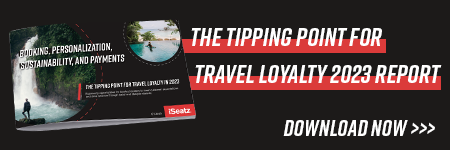Different generations have different relationships with the companies and brands they interact with. Unsurprisingly, they have varied priorities for and attitudes toward loyalty programs too. Our latest research report: Booking, Personalization, Sustainability, and Payments: The Tipping Point for Travel Loyalty in 2023, uncovers some of those differences, specifically around travel loyalty.
Understanding how and why age groups diverge in their approach to travel loyalty can be a crucial advantage for brands working hard to keep customers engaged or grow their loyalty program membership.
Targeting younger generations
For most companies, this means understanding how to appeal to Millennials – the current largest generation of US adults in their prime earning and spending years – and Gen Z, representing the foundation of future growth.
Travel loyalty is relevant to these cohorts, as they are the generations most eager to travel. Our report found that 63% of Millennial and Gen Z consumers plan on traveling more this year, compared to 37% of Baby Boomers and GenXers surveyed.
But what do Millennials and Gen Z consumers want from their travel loyalty programs? And what sets them apart from the expectations and desires of their Boomer parents and Gen X older brothers and sisters?
Our report, based on a late 2022 survey of over 2,000 American consumers and 300 loyalty program professionals in the United States, provides plenty of insight into these generational differences. Let’s dive in!
Money-saving Millennials
First – and this is hardly a revelation amid inflation and rising economic uncertainty – Millennials want travel loyalty programs that will help them save money. Thirty-three percent of Millennials report "saving money on the cost of travel" is what they value most in a travel loyalty program, versus 26% of Baby Boomers, 27% of Gen Xers and 10% of Gen Z respondents. As Millennials are more likely than other generations to have young children in their households, their emphasis on savings may be partially attributable to the inherent higher cost of traveling with a family. They also say that deeper discounts would increase their loyalty program engagement more often (34%) than Gen X (28%), Boomers (24%) and Gen Z (11%).
The prioritization of value in their travel loyalty preferences is reflected in their overall approach to loyalty; Millennials were more likely to belong to multiple (3 to 5) loyalty programs than older generations and most likely to belong to credit card and banking loyalty programs, which offer rewards on a broad range of purchases. This indicates a more widespread awareness among Millennials of the value loyalty programs can deliver.
Whereas Boomers are more likely to belong to loyalty programs tied to specific purposes or brands like frequent flier programs (30%) or hotel loyalty clubs (24%), Millennials belong to broader-based programs and more of them.
That doesn’t mean that value is the Millennial generation's only priority. In fact, 57% are willing to spend more on a travel product or service through their loyalty program - up to 15% more - to earn extra points or status.
And as digital natives, both Millennials and Gen Z are attuned to the booking experience offered by travel loyalty programs; they’re substantially less tolerant of being linked out to another site (39%) or not finding all the options they want in one place (33%).
Highlight sustainability for sustainable loyalty program growth.
But perhaps the most striking generational difference is the importance of sustainability. Our survey found that 36% of Millennials and 44% of Gen Z said they would be more likely to book a trip through a loyalty program if the provider contributed a portion of its revenue to sustainability causes or organizations. If a travel loyalty program offered sustainability-related redemption options, 37% of Gen Z and 28% of Millennials said they would book more travel (only 13% of Baby Boomers felt the same).
This reflects a well-established understanding that climate and the environment are particular areas of concern for younger generations. Not only are they concerned, but they’re also acting by opting to spend their dollars with organizations that elevate sustainability.
Incorporating more sustainability-related reward options is one way for companies and brands to make their travel loyalty programs more appealing and engaging for Millennials and Gen Z consumers, but it's not the only way. Catering to their expectations for value – both through discounts and through earning points – and a cohesive booking experience is also essential.
But what's most important for companies and brands that want to take their travel loyalty strategies to the next level is understanding what matters most to their members and customers across generations and having the agility and technological resources to tailor their approach to those needs and expectations.
For more insight into how Americans of all generations feel about travel loyalty – and how loyalty programs are responding – download our latest report here:
Want to get more insights and updates from iSeatz? Sign up for our newsletter!

You can also learn more about iSeatz by reaching out to marketing@iseatz.com.

